Are you a Quiet Speculation member?
If not, now is a perfect time to join up! Our powerful tools, breaking-news analysis, and exclusive Discord channel will make sure you stay up to date and ahead of the curve.
Welcome, once again, to the Beginner's Guide. My quest to explain the general deck types in Modern is winding down, with only the Ramp and unusual archetypes to come. As you no doubt surmised either through pattern recognition or just reading the title, this week is about the fair combo decks.
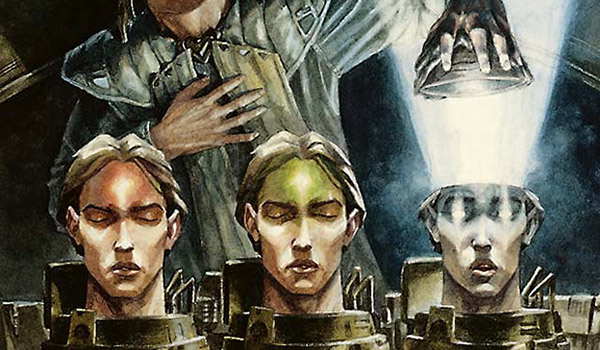
Hopefully this will not come as a surprise, but not every combo deck is unfair. in fact, unfair combos are far more rare in Magic than fair ones. Some of this is the result of design policy from Wizards, but a lot comes from the nature of the decks. Wizards prefers to avoid making unfair combos viable because players tend to dislike them. They've experimented with enabling combos like that and consistently end up regretting it. Furthermore, it is relatively uncommon for the right mix of enablers, engines, and payoff cards to exist to allow truly unfair combos to work competitively. You can always find ways to do something broken, but the question is whether it's fast or consistent enough to actually win games. These are not problems for the fair combo decks.
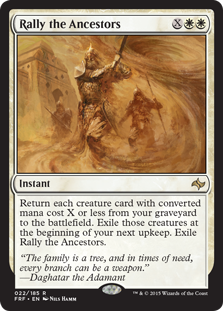 Wizards has shied away from any form of combo for years, but now some fair ones are starting to return to Standard. One of the most prominent from recent years was Rally the Ancestors. This is not always on purpose, but Sam Stoddard is on record saying that Wizards was deliberately keeping combo out of Standard and is now softening its stance. They are allowing some back in, so new Modern converts have at least some experience with this type of deck. To put it simply, fair combos win like a combo deck, but they don't have to enable their combo in any kind of special way. They play a reasonably fair game of Magic and win in one turn.
Wizards has shied away from any form of combo for years, but now some fair ones are starting to return to Standard. One of the most prominent from recent years was Rally the Ancestors. This is not always on purpose, but Sam Stoddard is on record saying that Wizards was deliberately keeping combo out of Standard and is now softening its stance. They are allowing some back in, so new Modern converts have at least some experience with this type of deck. To put it simply, fair combos win like a combo deck, but they don't have to enable their combo in any kind of special way. They play a reasonably fair game of Magic and win in one turn.
Occasionally I have been asked what deck type is most powerful. I usually prevaricate using the Socratic Method until the inquirer goes away. This is partly because I hate answering these types of questions, and partly because the correct answer is, "It depends," which no one finds satisfying. All the archetypes have had their moments in the sun and any can be "best" depending on what the rest of the room expected to face. That said, if you look over the history of Magic, the most powerful and dominating decks in multiple eras were fair combo decks. They're not the definitive best of all time, but they are where I'd start the conversation.
[wp_ad_camp_1]
What Is a Fair Combo?
Last week we defined unfair combo as those decks "that [are] built to break the rules." In contrast, fair combo doesn't center around degenerate mana generation or card draw—at least not when it comes to the win condition. There have been a number of fair combo decks that were remarkably unfair, even though the combo itself was fair. What defines a fair combo is that it doesn't require enabling. You may need to do some work before it will win, but the resource commitment is very low. A typical fair combo consists of 2-3 cards that do something on their own, but when put together they (nearly) instantly win the game. There's no need to generate absurd amounts of mana or draw your deck. You just play your cards like a normal deck and if you play the right ones in the right order you win. Simple.
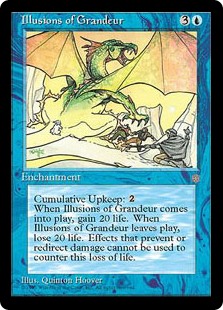 Fair combos are often described and understood in terms of unfair ones but that isn't really, um, fair. They may look similar but like walruses and manatees they have very different lineages. The true competitive lineage of fair combos goes back not to Prosbloom but to Trix. For those who don't know, Trix was a cross-format powerhouse from the Urza block era that won by using Donate on Illusions of Grandeur and killing the opponent when they couldn't pay the cumulative upkeep. The original Trix deck relied on some fantastically broken cards to find the combo, namely Necropotence and Demonic Consultation, but it was also one of the best control decks of the day. Where the other decks of the era had to blitz out the gate and win with a broken sequence, Trix would accelerate out Necro, judiciously use Force of Will and Duress to not-lose, and then assemble their combo and win just like a control deck. This was more obvious in later UR incarnations when the broken cards were either banned or rotated and the deck slowed down.
Fair combos are often described and understood in terms of unfair ones but that isn't really, um, fair. They may look similar but like walruses and manatees they have very different lineages. The true competitive lineage of fair combos goes back not to Prosbloom but to Trix. For those who don't know, Trix was a cross-format powerhouse from the Urza block era that won by using Donate on Illusions of Grandeur and killing the opponent when they couldn't pay the cumulative upkeep. The original Trix deck relied on some fantastically broken cards to find the combo, namely Necropotence and Demonic Consultation, but it was also one of the best control decks of the day. Where the other decks of the era had to blitz out the gate and win with a broken sequence, Trix would accelerate out Necro, judiciously use Force of Will and Duress to not-lose, and then assemble their combo and win just like a control deck. This was more obvious in later UR incarnations when the broken cards were either banned or rotated and the deck slowed down.
This is the common thread among all fair combo decks. They have a fair plan that includes a combo win. The fair plan may be a win condition on its own, as in Abzan Company, but it doesn't have to be. It was said of Trix that it was such a good control deck that it had to win by combo, and this is true of its many Modern descendants, most notably Scapeshift. Simply put, fair combos play fair Magic until they just win.
Strengths and Weaknesses
Fair combo decks have a number of strengths stemming from their hybrid nature. The sudden combo win ensures that your opponent is always on the clock while the fair plan allows you to fight through or ignore dedicated combo hate. You can attack from multiple angles and at varying speeds, and this means that you dictate the pace and length of the game. This was Splinter Twin's greatest strength—its combo was instant speed (effectively) and as a result your opponent could never comfortably tap out. The combination of fair cards and a combo win translates into control of the game.
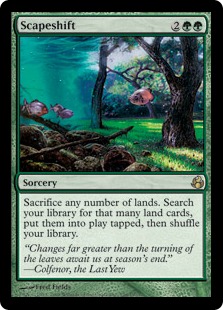 The second great strength is that these are very robust combos. An unfair combo requires a chain of cards to go off and if the chain breaks they fail. Unfair combos are also so dedicated to the combo that they have no backup plan if the combo fails to come together. Fair combos make or buy the time they need with their fair plan. They're either answering their opponent or presenting non-combo threats to force the opponent onto the back foot, which keeps them from disrupting the combo kill. Furthermore, once the combo is assembled it just wins. There is no risk of fizzling. Storm can fizzle. Cheerios can fizzle. If Scapeshift resolves the combo cannot fizzle (unless you've made a mistake and fetched all your Mountains). As such, these are far scarier combos. You might not be dead if Eggs or Storm goes off, but you are definitely dead if Splinter Twin goes off. And there's a good chance that they went off through disruption because fair combos pack answers and interaction.
The second great strength is that these are very robust combos. An unfair combo requires a chain of cards to go off and if the chain breaks they fail. Unfair combos are also so dedicated to the combo that they have no backup plan if the combo fails to come together. Fair combos make or buy the time they need with their fair plan. They're either answering their opponent or presenting non-combo threats to force the opponent onto the back foot, which keeps them from disrupting the combo kill. Furthermore, once the combo is assembled it just wins. There is no risk of fizzling. Storm can fizzle. Cheerios can fizzle. If Scapeshift resolves the combo cannot fizzle (unless you've made a mistake and fetched all your Mountains). As such, these are far scarier combos. You might not be dead if Eggs or Storm goes off, but you are definitely dead if Splinter Twin goes off. And there's a good chance that they went off through disruption because fair combos pack answers and interaction.
The third, and underappreciated, strength is their simplicity. It takes effort to mess up a fair combo. Poor sequencing, lapses in concentration, and miscounted mana have doomed many Storm players. All you need to do is enchant Deceiver Exarch with Splinter Twin to win. I know how dismissive and condescending this sounds, but over a long tournament playing a combo that plays itself will save you losses from fatigue.
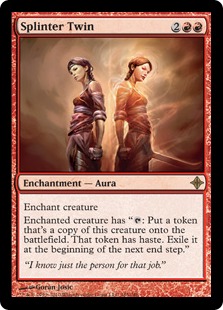 For all these reasons, fair combos are some of the most successful decks in Magic's history. Splinter Twin has a long history of high-level wins, just like Trix before it. These decks' versatility, power, and robustness make them arguably the best combo decks in the history of the game. These decks have the disruption to beat more unfair combos and the resilience to power through fair decks. Furthermore, they can win out of nowhere. Against unfair decks this creates a potent clock (go off now or I kill you) while letting them dodge a losing attrition fight against fair decks. Other archetypes may look more threatening, but history is on fair combo's side.
For all these reasons, fair combos are some of the most successful decks in Magic's history. Splinter Twin has a long history of high-level wins, just like Trix before it. These decks' versatility, power, and robustness make them arguably the best combo decks in the history of the game. These decks have the disruption to beat more unfair combos and the resilience to power through fair decks. Furthermore, they can win out of nowhere. Against unfair decks this creates a potent clock (go off now or I kill you) while letting them dodge a losing attrition fight against fair decks. Other archetypes may look more threatening, but history is on fair combo's side.
However, the hybrid nature of these decks is also a weakness. Most of the time their fair plan isn't actually good in comparison to decks dedicated to that plan. Abzan Company can win either via the Melira combo or by being a Gavony Township beatdown deck. However, GW Hatebears is much better at Gavony Township beatdown than Company. RUG Scapeshift plays like a RUG control deck until it is time to go off, but it isn't as good at being a control deck as dedicated Jeskai or Esper Control.
Similarly, the fair combo decks are slower than dedicated unfair combos. Twin could not win before turn four. Cheerios can win on turn two. The inclusion of a fair plan necessarily slows down the kill speed. Trying to speed up the fair combo often distorts the deck and it doesn't work as well. You have to recognize that your deck is made of compromises—good ones, mind—but you're never going to do any one thing as well as a specialist.
Play Fair, Win Suddenly
The key to correctly playing fair decks is to play on your opponent's fear. You can win at any time, so threaten to do so. Splinter Twin was a house for years because the mere threat of the combo ensured that opponents would play around it, disrupting their own gameplans just to ensure they didn't die. Opponents never wanted to tap out, unless they had looked at your hand first, so they couldn't curve out efficiently and thus slowed down their own gameplans. Once you're at the critical turn when you could win, it is important to always act like you can win and you're just looking to play around your opponent. Even if you don't actually have the win, you must make your opponent respect it.
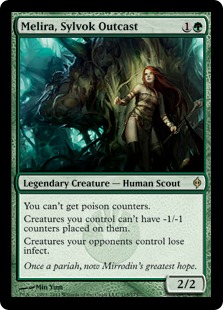 It is not, however, enough to just threaten the combo and wait to go off. If you just wait around until you have your combo in hand, the opponent will have plenty of time to sculpt their own hand and/or build their board state. While you do play answers and protection, you will never have enough cards in hand to beat an opponent with a hand full of answers. Or you might just die while waiting for your combo to materialize. You need to do something to make the opponent expend resources so that they're depleted when you go off.
It is not, however, enough to just threaten the combo and wait to go off. If you just wait around until you have your combo in hand, the opponent will have plenty of time to sculpt their own hand and/or build their board state. While you do play answers and protection, you will never have enough cards in hand to beat an opponent with a hand full of answers. Or you might just die while waiting for your combo to materialize. You need to do something to make the opponent expend resources so that they're depleted when you go off.
This can be actively searching or building to the combo, like Scapeshift, or it can be presenting other threats and attacking your opponent, like Abzan Company. Twin's main game was as a Snapcaster Mage deck that out-valued and out-tempoed opponents until they could not stop the combo. Your goal is to set the tone and pace of the game to force the opponent to play on your terms until your combo comes online. When you let your opponent dictate the game, you will fall behind, which puts you into go-off-or-die territory, and unlike unfair combos you can't exactly start going off and hope to get there. You either have it or you don't, and there aren't enough cantrips or tutors in Modern to help you.
Finally, it is important to recognize whether your opponent can disrupt you, and how. This determines what kind of game you will play. An opponent that cannot actually stop you will try to race your combo kill. Depending on your combo this will either dictate that you go all-in on comboing as quickly as possible or that you fall back on the fair plan, take control of the game, and win at your leisure. An opponent that can answer your combo with certainty will play relatively fearlessly. This may force you to try to combo multiple times, which is unlikely in these kinds of decks, or necessitate complete abandonment of your combo. As long as Jund had Abrupt Decay in hand it could never lose to Splinter Twin. This meant that Twin players had to fight an attrition battle either to get the Abrupt Decay out of Jund's hand or invalidate the answer by chip-shotting them to death. Your deck is adaptable, so you have to learn to adapt to the situation you face.
Beating Fair Combo
Fair combos tend to win relatively conventionally. They're resolving a single spell or winning with a combo based around creatures. As a result they can usually be disrupted by normal means. Kill the important creature, counter or discard the important spell and you beat the combo. In contrast to unfair combos, it will be fairly obvious which piece you need to stop to break up the combo.
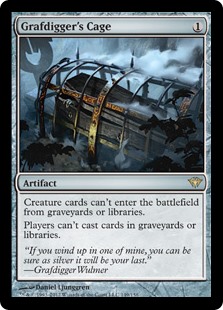 The real challenge is whether you can disrupt the combo while still winning the game. These decks have ways to keep you from winning while they find their combo, and if you ignore their combo you may just lose. The key is to recognize that they are jacks of all trades, but masters of none. Use your unique power to win before they do. Fast decks can get under the fair combo win before they can threaten the combo. True control decks can win the attrition fight against the combo deck. Respect the instant win, but don't let it dominate the game. The best strategy I've found is to make the combo deck combo before they feel safe doing so. Then the fight will be on your terms, and that is a fight you can win.
The real challenge is whether you can disrupt the combo while still winning the game. These decks have ways to keep you from winning while they find their combo, and if you ignore their combo you may just lose. The key is to recognize that they are jacks of all trades, but masters of none. Use your unique power to win before they do. Fast decks can get under the fair combo win before they can threaten the combo. True control decks can win the attrition fight against the combo deck. Respect the instant win, but don't let it dominate the game. The best strategy I've found is to make the combo deck combo before they feel safe doing so. Then the fight will be on your terms, and that is a fight you can win.
It's also important to note that hate cards aren't as effective as you might think against fair combos. Yes, they can slow down or even prevent the combo, but a fair combo can ignore their own combo if necessary and win around hate. They can also answer hate more easily than unfair combo, since they're already planning to interact well into the late game. As a result, I recommend against targeted hate for fair combos. Instead play cards that impact the fair gameplan. The deck is mostly fair, so if you have something that attacks that dimension you'll be far better off. Bonus points if it also harms the combo, as Grafdigger's Cage does against Abzan Company. It stops the tutor engine, the main fair plan, and the combo kill. Efficient and effective.
Suddenly, It's Over!
Fair combo decks have an illustrious pedigree for a very good reason. These decks are versatile, powerful, and surprisingly fast. If you do not respect them, you will pay the price. However, this power comes at the price of compromise. They're simply not as good at anything as specialized decks. The whole is greater than the sum of the parts, however. Complacency is fatal.
Next week, Ramp decks.





” As long as Jund had Abrupt Decay in hand it could never lose to Splinter Twin.”
As much as I want to create the perception that Twin wasn’t all that and it’s safe to unban… this statement isn’t actually true. Post-board (and rarely, preboard) some lists packed a Mizzium Skin precisely to “counter” Abrupt Decay (or any other removal) aimed at the Pestermite or Exarch. That being said, playing against Jund or Abzan was always tricky because the Skin was usually a 1 or 2 of, so you had find it first. But you could just win sometimes because the BGx player didn’t respect the possibility.
Anyhow, let’s hope March brings some good news. No Modern ProTour WotC, can we have Twin back please?
I was simplifying things to make a point. Post-board Twin vs Jund was one of the tensest matchups I’ve ever seen.
As long as we have Ancestral Vision, I cannot imagine getting Twin back. Twin was really good on its own, and Vision is really good against its rival Jund. I don’t think it healthy to have both, and I suspect Wizards wants to let Vision run free for a while yet.